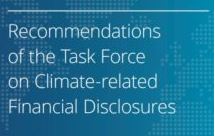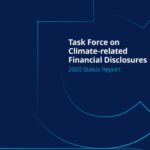
The Task Force on Climate-related Financial Disclosures (TCFD) in London today announced the publication of its report – Recommendations of the Task Force on Climate-related Financial Disclosures (report). The Report outlines a set of recommendations for voluntary, decisionuseful, climate-related disclosures to be made as part of mainstream financial filings.
The recommendations will help organizations identify and disclose information needed by investors, lenders, and insurance underwriters to appropriately assess and price climaterelated risks and opportunities. They are issued today for public consultation. The Financial Stability Board established the TCFD in December 2015. The Task Force’s recommendations are the result of the first global, industry-led effort to create recommendations for climate-related financial disclosures. In developing its recommendations, the Task Force has benefited from extensive global outreach across regions, industries and expertise. The recommendations focus on four thematic areas that generally reflect how organizations operate: governance; strategy; risk management; and metrics and targets.
The Task Force’s recommendations offer a number of key features, including:
- Adoptable by companies of all types, across sectors and jurisdictions
- Designed for inclusion in mainstream financial filings
- Elicit decision-useful, forward-looking information on climate-related financial impacts
- Include describing the potential impact of different scenarios (including a 2°C scenario) on the organization’s businesses, strategy, and financial planning
- Increase focus on risks and opportunities related to a transition to a lowercarbon economy
The Task Force members are experts from private sector preparers and users of corporate financial disclosures from around the world. The Task Force focuses on disclosures related to the financial impacts of climate change on a company; rather than a company’s impact on climate change.
The Task Force’s recommendations benefit organizations in the following ways:
- Provide a foundation for immediate adoption and are flexible enough to evolve as climate-related disclosure practices mature
- Promote board and senior management engagement on climate-related issues
- Bring the “future” state of climate-related financial issues into the present through scenario analysis
- Support understanding of the financial and non-financial sectors’ financial exposure to climate-related issues
Michael R. Bloomberg, Chairman of the Task Force said, “The Recommendations of the Task Force on Climate-related Financial Disclosures report represents an important effort by the private sector to improve transparency around climate-related financial risks and opportunities. Climate change is not only an environmental problem, but a business one as well. We need business leaders to join us to help spread these recommendations across their industries in order to help make markets more efficient and economies more stable, resilient, and sustainable.”
TCFD – Michael R. Bloomberg Recommendations Report Launch Video Message from Secretariat TCFD on Vimeo.
Speaking about the draft recommendations, FSB Chair Mark Carney said: “The disclosure recommendations will give financial markets the information they need to manage risks, and seize opportunities, stemming from climate change. As a private sector solution to a market issue, the Task Force has focused on the practical, material disclosures investors want and which all capital-raising companies can compile.”
The release of the report launches a 60-day public consultation period to solicit feedback on the TCFD report and recommendations until 12 February 2017. The Task Force encourages the public to participate in the public consultation survey at www.fsb-tcfd.org.
The report, annex and technical supplement on scenario analysis are available here:
- Recommendations report
- Annex: Implementing the Recommendations of the TCFD
- Technical supplement: The Use of Scenario Analysis



